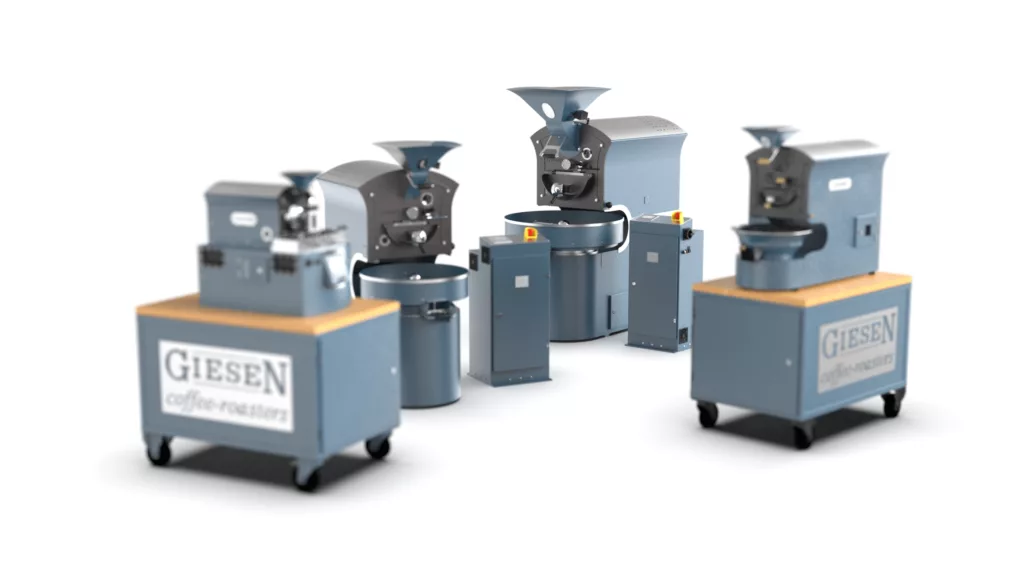There are many different reasons to look into an electric coffee roaster; a future-proof solution, not wanting to depend on gas, environmental considerations, as well as the additional connection work are factors that come into play when making the choice of gas or electricity. At Giesen, we developed four electric roasters for people who want to roast coffee on electricity. After all, these machines operate on electricity only. In this blog, we explain the main differences in specifications, use, and results between gas and electric roasters.
Electric roaster types

Before talking about the differences, let’s elaborate on the different electric models we offer at Giesen:
WPE1 – Electric sample roaster (50 – 200 gram per batch roasting capacity)
Our WPE1 is the smallest electric roaster we offer. Designed to roast without gas, and easy to operate, and simple installation.
W1E – Electric shop roaster (0,75 – 1,5 kg per batch roasting capacity)
The W1E is the smallest electric production roaster we offer. A perfect in-between solution that fits between sample roasting and high-capacity production roasting.
W6E – Electric shop roaster (3 – 6 kg per batch roasting capacity)
When you are looking for a machine that allows you to roast electrically but with a high capacity, the W6E is a great option.
W15E – Electric shop roaster (7,5 – 15 kg per batch roasting capacity)
Ready to roast coffee on high capacity without the need to utilize gas? The latest addition to our range of electric roasters is the W15E.
Explaining the differences
To better point out the difference in coffee roasting on gas or electricity, in this blog we will highlight the differences between the W15A en W15E. Not only the differences in technology will be discussed, but also the usage; as this is not one-to-one the same. In fact, with the W15E, you have multiple heat sources all in one roaster. Curious? Read on!
Electric roasting; A different approach
Traditional electric coffee roasters use heat coils. These are filaments attached around the drum that transfer heat to the drum and thus the coffee beans. Heat coils are effective, and you are certainly able to roast good coffee with such a roaster. The other side is, however, that the response time of heat coils is inferior to that of gas. While a gas heat source responds immediately upon adjustment, heat spirals take more time to do so. Warming up will take longer, and when you turn off the heat source, the heat coils will not immediately stop giving off heat. Their temperature will decrease more slowly and gradually.
To address this, the Giesen W15E features a unique heating system. The W15E is fast, effective, and responds immediately to adjustments in temperature. Of course, without the use of gas. Curious as to how this works? Read on below.
The W15E’s unique heating system
To say goodbye to gas but not compromise on response time, ease of use and quality, we at Giesen came up with a unique heating system. This system uses two different heat sources; a hot air gun that blows hot air into the drum of the roaster, and three infrared panels that are fixed under the drum. The hot air gun provides the basic heat in your coffee roaster. The infrared panels can give your coffee roast just that extra boost you want in some cases. This way, you will never run out of power and your coffee roaster will have the same response time as the gas-powered W15A. Are you curious about how this works in practice? Then be sure to check out the Behind the Roast episode below in which Willem Boot explains to you exactly how the W15E works!
Why choose an electric roaster?
Our electric roasters embody cutting-edge technology and enable precise control over the roasting process. With customizable temperature and profile settings, you can fine-tune profiles to accentuate the unique flavor profiles of different coffee beans. This empowers artisans to consistently produce exceptional roasts with minimal variance. In an era of heightened environmental consciousness, electric roasters shine as eco-friendly alternatives. They generate fewer emissions compared to traditional gas-powered roasters, contributing to cleaner air quality and a smaller carbon footprint. This aligns with the ethos of sustainability that’s gaining traction in the coffee industry.
In essence, opting for an electric Giesen coffee roaster translates to a holistic approach. It’s a nod to technological advancement, a nod to efficiency, and a nod to a greener future. Whether you’re a boutique roastery seeking consistency or an environmentally-conscious coffee connoisseur, this choice encapsulates a blend of modernity and responsibility.
Financial advantages
With precise control, our electric roasters minimize bean wastage, leading to higher quality and consistency. And while gas prices can fluctuate, electricity costs are generally more stable and a much more future-proof way to roast coffee compared to gas. These advantages collectively make electric coffee roasters a prudent long-term investment with compelling financial returns.
In summary
To wrap it up, when it comes to picking between electric and gas coffee roasters, there’s a lot to think about. We talked about important things like how future-proof the choice is, caring for the environment, and how easy it is to set up. We have created different electric roasters to suit different needs, and the cool thing is, they only use electricity to work.
We explained the differences between electric and gas roasting, and focused on a special kind of electric roaster called the W15E. This one heats up quickly without needing gas, which is a common problem with other electric roasters.
Our W15E is praised for being really advanced and giving roasters precise control over how they roast their coffee. Plus, roasting on electricity is good for the planet because the emissions are way less. Choosing an electric Giesen roaster means you’re choosing technology, efficiency, and looking out for the Earth. And financially, electric roasters save money in the long run by wasting less coffee and having more stable energy costs.
Do you want to read more about the science behind coffee, the unique capabilities of our machines, or other subjects related to Giesen? Check out the Giesen blog articles here.





Dit bericht heeft 2 reacties
Hi,
I am living here in the Philippines and there is only one thing to say about electric roaster. We have here so many brown-out and black-out that you can not use electric for your main source. Secondary the electric is much more expensive than for example in Europe, another disadvantage. It will take decades to stabilize the power grid and so on, until than – only gas!
Hi Daniel, thank you for your message. We understand that the power supply can vary from country to country and also the quality of the network can certainly invade. In countries where the power grid is not yet stable enough to take power consistently, a Giesen gas coffee roaster is indeed a good alternative.